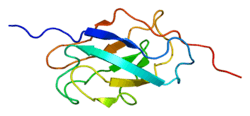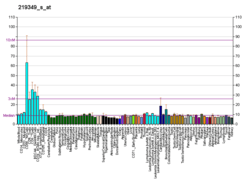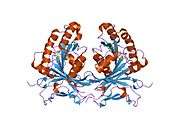EXOC2
Exocyst complex component 2 is a protein that in humans is encoded by the EXOC2 gene.[5][6][7]
The protein encoded by this gene is a component of the exocyst complex, a multiple protein complex essential for targeting exocytic vesicles to specific docking sites on the plasma membrane. Though best characterized in yeast, the component proteins and the functions of the exocyst complex have been demonstrated to be highly conserved in higher eukaryotes. At least eight components of the exocyst complex, including this protein, are found to interact with the actin cytoskeletal remodeling and vesicle transport machinery. This interaction has been shown to mediate filopodia formation in fibroblasts.[7]
References
- GRCh38: Ensembl release 89: ENSG00000112685 - Ensembl, May 2017
- GRCm38: Ensembl release 89: ENSMUSG00000021357 - Ensembl, May 2017
- "Human PubMed Reference:". National Center for Biotechnology Information, U.S. National Library of Medicine.
- "Mouse PubMed Reference:". National Center for Biotechnology Information, U.S. National Library of Medicine.
- Murthy M, Garza D, Scheller RH, Schwarz TL (Feb 2003). "Mutations in the exocyst component Sec5 disrupt neuronal membrane traffic, but neurotransmitter release persists". Neuron. 37 (3): 433–47. doi:10.1016/S0896-6273(03)00031-X. PMID 12575951.
- Sjolinder M, Uhlmann J, Ponstingl H (Dec 2002). "DelGEF, a homologue of the Ran guanine nucleotide exchange factor RanGEF, binds to the exocyst component Sec5 and modulates secretion". FEBS Lett. 532 (1–2): 211–5. doi:10.1016/S0014-5793(02)03677-3. PMID 12459492.
- "Entrez Gene: EXOC2 exocyst complex component 2".
Further reading
- Hsu SC, TerBush D, Abraham M, Guo W (2004). "The exocyst complex in polarized exocytosis". Int. Rev. Cytol. International Review of Cytology. 233: 243–65. doi:10.1016/S0074-7696(04)33006-8. ISBN 978-0-12-364637-8. PMID 15037366.
- Kee Y, Yoo JS, Hazuka CD, et al. (1998). "Subunit structure of the mammalian exocyst complex". Proc. Natl. Acad. Sci. U.S.A. 94 (26): 14438–43. doi:10.1073/pnas.94.26.14438. PMC 25013. PMID 9405631.
- Hsu SC, Hazuka CD, Roth R, et al. (1998). "Subunit composition, protein interactions, and structures of the mammalian brain sec6/8 complex and septin filaments". Neuron. 20 (6): 1111–22. doi:10.1016/S0896-6273(00)80493-6. PMID 9655500.
- Matern HT, Yeaman C, Nelson WJ, Scheller RH (2001). "The Sec6/8 complex in mammalian cells: characterization of mammalian Sec3, subunit interactions, and expression of subunits in polarized cells". Proc. Natl. Acad. Sci. U.S.A. 98 (17): 9648–53. doi:10.1073/pnas.171317898. PMC 55506. PMID 11493706.
- Sugihara K, Asano S, Tanaka K, et al. (2002). "The exocyst complex binds the small GTPase RalA to mediate filopodia formation". Nat. Cell Biol. 4 (1): 73–8. doi:10.1038/ncb720. PMID 11744922.
- Strausberg RL, Feingold EA, Grouse LH, et al. (2003). "Generation and initial analysis of more than 15,000 full-length human and mouse cDNA sequences". Proc. Natl. Acad. Sci. U.S.A. 99 (26): 16899–903. doi:10.1073/pnas.242603899. PMC 139241. PMID 12477932.
- Mott HR, Nietlispach D, Hopkins LJ, et al. (2003). "Structure of the GTPase-binding domain of Sec5 and elucidation of its Ral binding site". J. Biol. Chem. 278 (19): 17053–9. doi:10.1074/jbc.M300155200. PMID 12624092.
- Inoue M, Chang L, Hwang J, et al. (2003). "The exocyst complex is required for targeting of Glut4 to the plasma membrane by insulin" (PDF). Nature. 422 (6932): 629–33. doi:10.1038/nature01533. hdl:2027.42/62982. PMID 12687004.
- Fukai S, Matern HT, Jagath JR, et al. (2003). "Structural basis of the interaction between RalA and Sec5, a subunit of the sec6/8 complex". EMBO J. 22 (13): 3267–78. doi:10.1093/emboj/cdg329. PMC 165653. PMID 12839989.
- Moskalenko S, Tong C, Rosse C, et al. (2004). "Ral GTPases regulate exocyst assembly through dual subunit interactions". J. Biol. Chem. 278 (51): 51743–8. doi:10.1074/jbc.M308702200. PMID 14525976.
- Mungall AJ, Palmer SA, Sims SK, et al. (2003). "The DNA sequence and analysis of human chromosome 6". Nature. 425 (6960): 805–11. doi:10.1038/nature02055. PMID 14574404.
- Ota T, Suzuki Y, Nishikawa T, et al. (2004). "Complete sequencing and characterization of 21,243 full-length human cDNAs". Nat. Genet. 36 (1): 40–5. doi:10.1038/ng1285. PMID 14702039.
- Beausoleil SA, Jedrychowski M, Schwartz D, et al. (2004). "Large-scale characterization of HeLa cell nuclear phosphoproteins". Proc. Natl. Acad. Sci. U.S.A. 101 (33): 12130–5. doi:10.1073/pnas.0404720101. PMC 514446. PMID 15302935.
- Gerhard DS, Wagner L, Feingold EA, et al. (2004). "The status, quality, and expansion of the NIH full-length cDNA project: the Mammalian Gene Collection (MGC)". Genome Res. 14 (10B): 2121–7. doi:10.1101/gr.2596504. PMC 528928. PMID 15489334.
- Jin R, Junutula JR, Matern HT, et al. (2005). "Exo84 and Sec5 are competitive regulatory Sec6/8 effectors to the RalA GTPase". EMBO J. 24 (12): 2064–74. doi:10.1038/sj.emboj.7600699. PMC 1150893. PMID 15920473.
- Chien Y, Kim S, Bumeister R, et al. (2006). "RalB GTPase-mediated activation of the IkappaB family kinase TBK1 couples innate immune signaling to tumor cell survival". Cell. 127 (1): 157–70. doi:10.1016/j.cell.2006.08.034. PMID 17018283.
- Sulem P, Gudbjartsson DF, Stacey SN, et al. (2007). "Genetic determinants of hair, eye and skin pigmentation in Europeans". Nat. Genet. 39 (12): 1443–52. doi:10.1038/ng.2007.13. PMID 17952075.
This article is issued from Wikipedia. The text is licensed under Creative Commons - Attribution - Sharealike. Additional terms may apply for the media files.







